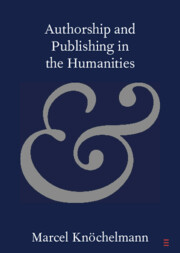Element contents
Authorship and Publishing in the Humanities
Published online by Cambridge University Press: 05 July 2023
Summary
Keywords
- Type
- Element
- Information
- Online ISBN: 9781009223089Publisher: Cambridge University PressPrint publication: 03 August 2023
References
- 5
- Cited by

